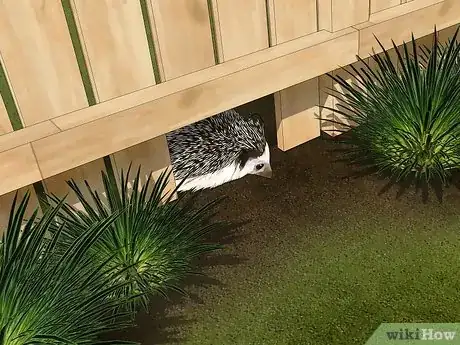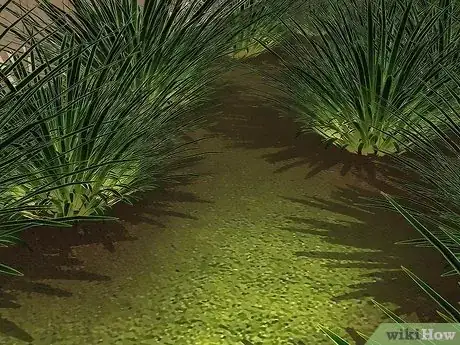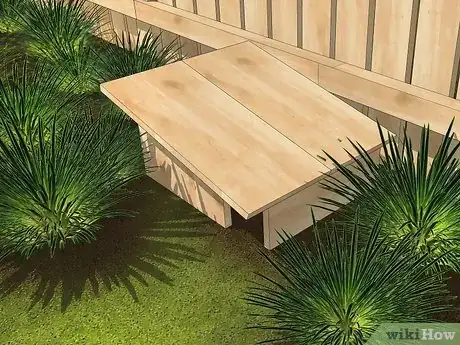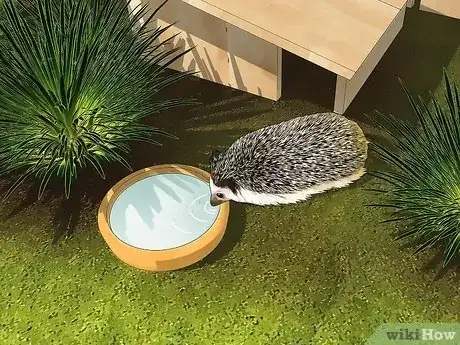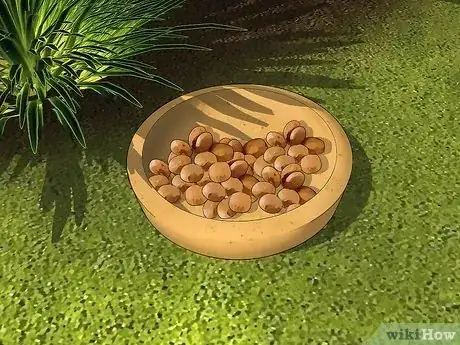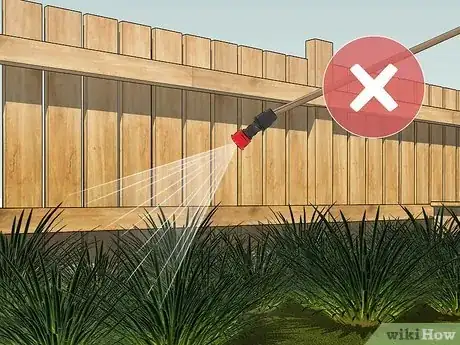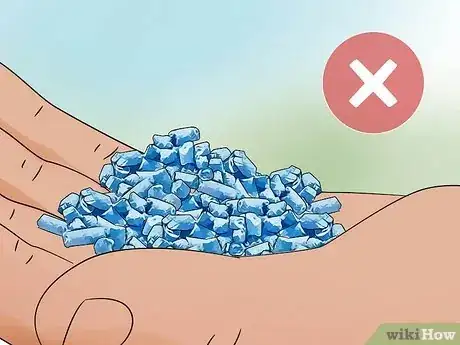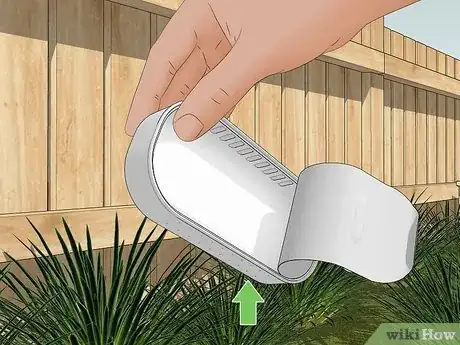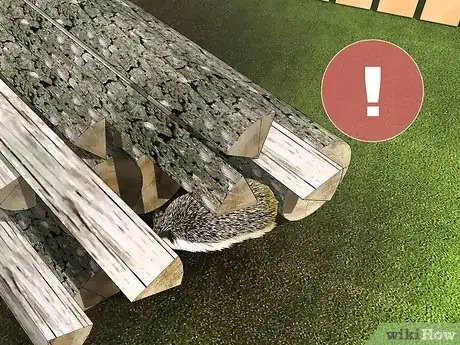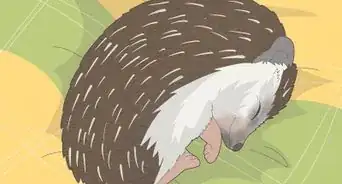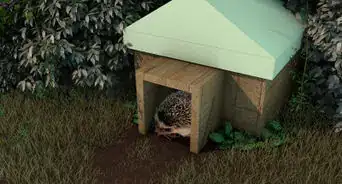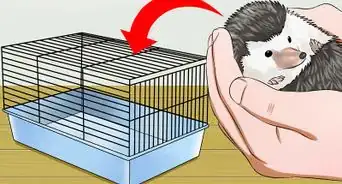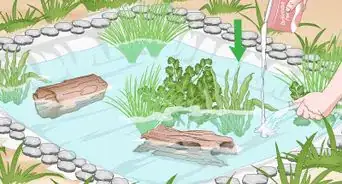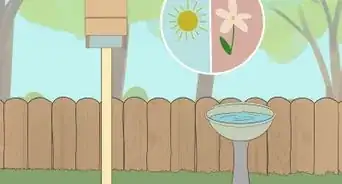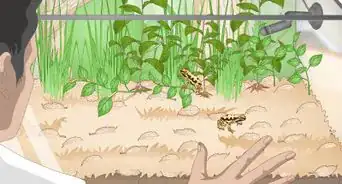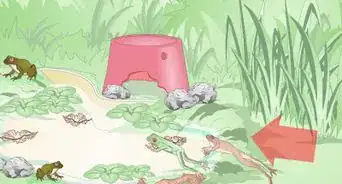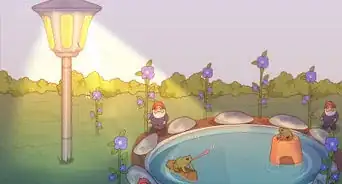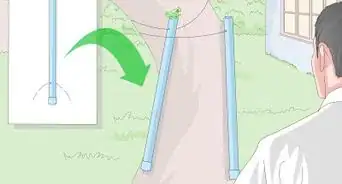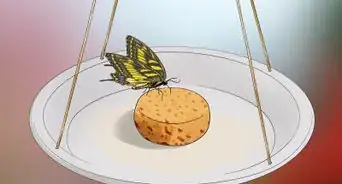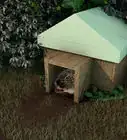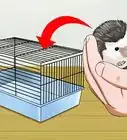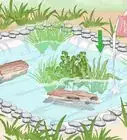wikiHow is a “wiki,” similar to Wikipedia, which means that many of our articles are co-written by multiple authors. To create this article, 9 people, some anonymous, worked to edit and improve it over time.
This article has been viewed 17,097 times.
Learn more...
Hedgehogs are garden helpers in their native environment; they chomp up slugs and snails and remove them from the garden. If you live in the UK you might be familiar with these curious little creatures. By making your garden an attractive and safe environment for hedgehogs, you might start seeing more hedgehog visitors if you're lucky. If you want some natural pest control or if you'd simply like more hedgehogs visiting your garden, here are some things to do that will encourage them.
Steps
Attracting Hedgehogs
-
1Have an entrance. Hedgehogs will have a lot of trouble visiting if your garden is enclosed by a fence or wall. To allow these creatures to safely and easily visit your garden you should consider adding a small hole to the barrier. A hole at ground level, about the size of a CD case, should allow hedgehogs to enter and exit freely. Hedgehogs typically travel over a mile every night while searching for food, so being able to roam freely is important. [1]
-
2Grow dense undergrowth in your garden. Hedgehogs are skittish and prefer to avoid open spaces, instead opting to hide in densely packed undergrowth. Grow shrubs close together and allow hedges to grow down low so that the undergrowth entwines together to create hedgehog havens.Advertisement
-
3Place a hedgehog home in your garden. To encourage hedgehogs to stay in your garden they will need shelter. They can easily find shelter in piles of wood or other enclosed spaces, but you can also build or buy a specialised home for them. Hedgehog homes are small boxes with a small entrance for hedgehogs, typically with an insulated chamber to keep them and any potential hoglets warm. The home should be lined with layer of dry, dead leaves to make them feel comfortable. [2]
- One hedgehog home will suffice for a single hedgehog, but you can place up to three in your garden if you'd like to attract more. Keep them well spaced apart as hedgehogs are solitary critters. [3]
- Place any homes you've built or purchased in a quiet spot in your garden where they won't be disturbed much. Try to keep it in a shady spot that's out of the sun.
-
4Offer them water. Place a small dish of water out in your garden where the hedgehogs will be able to find it. Change the water periodically to keep it fresh and discourage any bugs. This is great not only for hedgehogs, but for any other animals that visit your garden.
- During the winter, replace the water or break the ice when it freezes. Having a source of water is very much appreciated this time of year when most other water sources are frozen at night.
-
5Supplement their diet if necessary. For a long winter or periods of drought, consider feeding them. You can leave out a small dish of cat or dog food for hedgehogs, but only do this if spring is taking a long time to arrive.[4] Otherwise, hedgehogs should be left to fend for themselves.
- If you do put out food for them, be sure not to give them any human food. Some might believe they enjoy bread or milk, but this is actually harmful for hedgehogs who cannot digest this food properly.
Keeping Hedgehogs Safe
-
1Avoid using pesticides and other chemicals around the garden. Hedgehogs survive off of a hefty diet of insects. But pesticides deplete the insect population and introduce poison to any hedgehogs that eat the affected insects. If you have enough hedgehogs visiting your garden, they'll help keep the bug population down naturally.
- Slug pellets can also present a risk to hedgehogs in your garden. The poison present in the slug pellets can accumulate in the hedgehog overtime if they eat a number of slug pellets or poisoned slugs, so it's best to avoid using them in your garden. [5]
-
2Keep your garden free of litter. Hedgehogs are especially prone to getting tangled in string, netting, and other assorted trash due to their spines. Remove any litter from your yard and store any netting inside when not in use to keep them safe. If you do have netting out, keep it off the ground and taut to reduce to chances of hedgehogs getting entangled.[6]
-
3Check under wood piles before trying to burn them. Hedgehogs will often hide or nest under piles of wood. So, if you're planning on a having a bonfire be sure to move the wood and check thoroughly before burning anything. Additionally, it's a good idea to check piles of leaves, compost, or other rubbish beforehand if you plan on disposing of them.
-
4Keep your pond safe for hedgehogs. If you have a pond in your garden, make sure there is a way for hedgehogs to easily exit if they enter. They are decent swimmers, but will have trouble leaving the water if the edges are too steep. Place a ramp or some stones to help them out if they find themselves stuck.
Community Q&A
-
QuestionIf my garden hedgehog is no longer around, is it possible that my dog scared it off?
 Community AnswerYes, it's possible, but more likely the hedgehog has found another garden or passed away. Even if it was temporarily scared off by your dog, it would likely come back eventually.
Community AnswerYes, it's possible, but more likely the hedgehog has found another garden or passed away. Even if it was temporarily scared off by your dog, it would likely come back eventually. -
QuestionWhy do hedgehogs roll up into a ball?
 Community AnswerHedgehogs roll up in a ball to protect themselves from possible threats, things that are trying to hurt them or eat them.
Community AnswerHedgehogs roll up in a ball to protect themselves from possible threats, things that are trying to hurt them or eat them. -
QuestionWe have a fully enclosed garden. A hedgehog has arrived during some renovation work. Is it okay to keep it, or should we take it to a park?
 Community AnswerIf it's happy in the garden, leave it. If it seems stressed (pacing or out during the day), take it to a nearby field or park. Taking them too far could discombobulate them and stress them out, possibly leading to their demise.
Community AnswerIf it's happy in the garden, leave it. If it seems stressed (pacing or out during the day), take it to a nearby field or park. Taking them too far could discombobulate them and stress them out, possibly leading to their demise.
Warnings
- Don't handle wild hedgehogs. They're not friendly, they're easily irritated and they're infested with fleas.⧼thumbs_response⧽
- Do not give hedgehogs milk! Many people make this mistake. Hedgehogs may enjoy milk, but they are lactose intolerant and milk will cause chronic diarrhea, and can potentially be fatal.⧼thumbs_response⧽
References
- ↑ https://www.wildlifeonline.me.uk/articles/view/how-to-make-your-garden-hedgehog-friendly
- ↑ https://www.rspb.org.uk/get-involved/activities/nature-on-your-doorstep/garden-activities/build-a-hedgehog-house/
- ↑ https://www.countryliving.com/uk/homes-interiors/gardens/a19772562/how-attract-hedgehogs-into-garden-hedgehog-houses/
- ↑ https://www.rspb.org.uk/birds-and-wildlife/advice/gardening-for-wildlife/homes-for-hedgehogs/
- ↑ https://www.wildlifeonline.me.uk/questions/answer/do-slug-pellets-pose-a-risk-to-hedgehogs
- ↑ https://www.britishhedgehogs.org.uk/leaflets/Hedgehog-Street-top-tips.pdf
